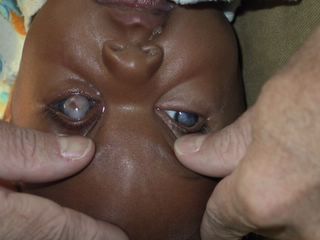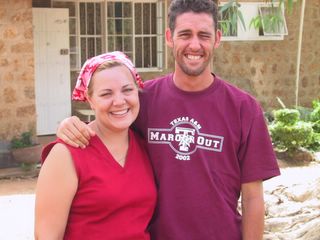Salon.com News | Democracy's birth pangs: "March 1, 2005 | Hind el-Hinnawy shocked conservative Muslim Egypt when she publicly declared herself a single mom and launched a paternity suit. The man in the case, Ahmed el-Fishawy, hosted a television talk show offering advice to devout Muslim youth. They had met on the set of a comedy called 'When Daddy Returned.'
Hinnawy's stand became a national talking point in a country where, in theory, premarital sex is banned. Even the grand mufti intervened. But equally surprising, from some points of view, was the support the 27-year-old received for her challenge to what she deemed the hypocrisy of a male-dominated society.
The response to the scandal is said to be indicative of how Egypt is changing. Fishawy's pious chat show has been canceled. And last week, in a precedent-setting ruling, a judge ordered him to undergo a DNA test. An expectant nation awaits the result. "
Taboo breaking in Egypt appears to be catching on at the very top. On Feb. 26, Hosni Mubarak, Egypt's president since 1981, amazed his compatriots by proposing a multiparty presidential election for the first time in Egyptian history. Until now Mubarak and his predecessors have been endorsed, not elected, in single-candidate referendums. "I took the reins of this initiative in order to start a new era of reform," Mubarak said. "The president will be elected through direct, secret balloting, opening the opportunity for political parties to run." He was convinced, he said, "of the need to consolidate efforts for more freedom and democracy."
If so, this marks a dramatic conversion. Egypt has been under a state of emergency and martial law since Anwar Sadat's assassination. Mubarak has habitually ruled with caution and an iron fist. Tolerating no rivals, he has no vice president and is suspected of grooming his son, Gamal, to succeed him.
The government exercises enormous patronage and closely controls the media. The main opposition party, the Muslim Brotherhood, is banned. Last month, Ayman Nour, leader of the Ghad (Tomorrow) Party, was jailed and allegedly physically abused. As recently as Feb. 24, a party meeting in Cairo was broken up by "thugs in white training suits and men armed with handguns," according to a Ghad spokesman.
"Serious issues like routine torture of persons in detention and suppression of nonviolent political dissent remain unaddressed," Human Rights Watch said in its latest report. "Emergency rule provides the basis for arbitrary detention and trials before security courts."
Undaunted, reformers have been putting pressure on Mubarak with increasing vigor. Nour is one standard-bearer. Another is the street-level Kifaya (Enough) movement, which has taken inspiration from similarly named activist groups in Serbia and Ukraine, and most recently in Lebanon.
Opponents including the Muslim Brotherhood welcomed Mubarak's shift, but said it did not go anywhere near far enough. "It remains cosmetic and incomplete ... unless it is coupled with canceling emergency laws, releasing all political prisoners and giving complete freedom to the formation of parties," a Kifaya statement said.
Amid confusion about exactly how an individual or party can qualify to stand in September's election, both government and opposition supporters, and the public, appear convinced that Mubarak will in any event win a fifth term. This has led some critics to reject the Feb. 26 speech as little more than a sop to George W. Bush's pro-democracy agenda. The U.S. leader has repeatedly called on Egypt in recent weeks to spearhead reform in the Arab world.
The United States in effect withheld $1 billion in economic aid and $20 million in democracy-building funds last month. The day before Mubarak spoke, the U.S. Secretary of State Condoleezza Rice ostentatiously canceled a visit to Cairo, partly in protest at Nour's treatment. Washington, which has to be careful not to interfere too much, said it hoped Mubarak's initiative would lead to real change. And he may conceivably have started something he cannot stop. As the Hinnawy paternity case suggested, taboo breaking is hazardous, and democracy's birth pangs can be painful, especially for a national father figure.








